July is Disability Pride Month. This blog post features book selections from the CSUN University Library collection that highlight themes of disability justice, history, and community. We will also discuss the history of Disability Pride Month and the importance of celebrating this observance.
The History of Disability Pride in July
From “Why and How to Celebrate Disability Pride Month,” by The Arc:
“Disability Pride Month is a time to recognize the history, achievements, experiences, and struggles of people with disabilities. It affirms that disability is a natural and valuable part of human diversity—not a deficit or condition to be fixed.
More than 1 in 4 adults in the United States—over 70 million people—have a disability. This month calls on everyone to promote inclusion and ensure people with disabilities are accepted exactly as they are, without conditions.
What Is Disability Pride Month?
Disability Pride Month is an annual observance in July that celebrates people with disabilities, commemorates the signing of the Americans with Disabilities Act (ADA), and promotes disability culture and visibility.
Observed every July, Disability Pride Month recognizes the importance of the ADA, which was signed into law on July 26, 1990. It highlights disability culture, history, and community pride. This month challenges the harmful idea that people with disabilities need to conform to norms to live meaningful lives. Their lives are just as full, valuable, and worthy of respect—no more, no less.
The first Disability Pride celebration was a Disability Pride Day that took place in Boston in 1990. Chicago hosted the first Disability Pride Parade in 2004. Now there are events nationwide empowering people with disabilities to take pride in who they are.
Here’s more about the history of Disability Pride Month and the story behind the flag.
2025 Theme: “We Belong Here, and We’re Here to Stay”
The Arc’s National Council of Self-Advocates selected the 2025 Disability Pride Month theme: We Belong Here, and We’re Here to Stay. It delivers a powerful message—people with disabilities are a vital part of every community. Not someday. Not conditionally. Now.
As disability rights face growing threats in education, employment, health care, and public life, this year’s theme is a clear call to action. It pushes back against ableism—discrimination and bias against people with disabilities—and exclusion. It reminds us that people with disabilities will not be erased, ignored, or pushed aside.”
Recommended Readings for Disability Pride
In The Future Is Disabled, Leah Lakshmi Piepzna-Samarasinha asks some provocative questions: What if, in the near future, the majority of people will be disabled—and what if that’s not a bad thing? And what if disability justice and disabled wisdom are crucial to creating a future in which it’s possible to survive fascism, climate change, and pandemics and to bring about liberation? Building on the work of her game changing book Care Work: Dreaming Disability Justice, Piepzna-Samarasinha writes about disability justice at the end of the world, documenting the many ways disabled people kept and are keeping each other—and the rest of the world—alive during Trump, fascism and the COVID-19 pandemic. Other subjects include crip interdependence, care and mutual aid in real life, disabled community building, and disabled art practice as survival and joy. Written over the course of two years of disabled isolation during the pandemic, this is a book of love letters to other disabled QTBIPOC (and those concerned about disability justice, the care crisis, and surviving the apocalypse); honor songs for kin who are gone; recipes for survival; questions and real talk about care, organizing, disabled families, and kin networks and communities; and wild brown disabled femme joy in the face of death. With passion and power, The Future Is Disabled remembers our dead and insists on our future.– from the publisher
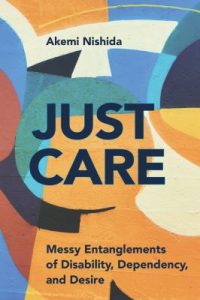
“Just Care examines care as a site where the somatic, the political economy, and intersectional social oppressions manifest and materialize interactively, while it is also a vision and praxis for radically collective and affectionate ways to live and transform society”– Provided by publisher.
James Charlton has produced a ringing indictment of disability oppression, which, he says, is rooted in degradation, dependency, and powerlessness and is experienced in some form by five hundred million persons throughout the world who have physical, sensory, cognitive, or developmental disabilities. Nothing About Us Without Us is the first book in the literature on disability to provide a theoretical overview of disability oppression that shows its similarities to, and differences from, racism, sexism, and colonialism. Charlton’s analysis is illuminated by interviews he conducted over a ten-year period with disability rights activists throughout the Third World, Europe, and the United States. Charlton finds an antidote for dependency and powerlessness in the resistance to disability oppression that is emerging worldwide. His interviews contain striking stories of self-reliance and empowerment evoking the new consciousness of disability rights activists. As a latecomer among the world’s liberation movements, the disability rights movement will gain visibility and momentum from Charlton’s elucidation of its history and its political philosophy of self-determination, which is captured in the title of his book. Nothing About Us Without Us expresses the conviction of people with disabilities that they know what is best for them. Charlton’s combination of personal involvement and theoretical awareness assures greater understanding of the disability rights movement — from the publisher
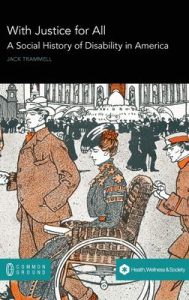
With Justice for All” is a narrative social history of disability in America. This book incorporates individual lived experiences, historical figures, legal developments, and social movements. The story of disability told here is arguably the story of America. Historian Douglas Bayton maintained that disability is everywhere-once you begin to look for it-and this text attempts to look in many places, some of which have not been looked into before by the critical scholarly eye. The story also brings the Disability Rights Movement (DRM) into its proper historical position, side by side with the Civil and Gender Rights Movements and the ongoing imagination of a more equitable America– Provided by publisher.
“There was a time in the United States when children with disabilities weren’t allowed to go to public school. But in 1971, seven kids and their families wanted to do something about it. They knew that every child had a right to an equal education, so they went to court to fight for that right. The case Mills v. Board of Education of the District of Columbia led to laws ensuring children with disabilities would receive a free public education. Janine Leffler, one of the millions of kids who attended school as a result of these laws, tells the true story of this landmark case”–Provided by publisher.
Part and parcel to the civil rights movements of the past thirty years has been a sustained, coordinated effort among disabled Americans to secure equal rights and equal access to that of non-disabled people. Beyond merely providing a history of this movement, Sharon Barnartt and Richard Scotch’s Disability Protests: Contentious Politics, 1970-1999 offers an incisive, sociological analysis of thirty years of protests, organization, and legislative victories within the deaf and disabled populations.The authors begin with a thoughtful consideration of what constitutes “contentious” politics and what distinguishes a sustained social movement from isolated acts of protest. The numbers of disability rights protests are meticulously catalogued over the course of thirty years, revealing significant increases in both cross-disability actions as well as disability-specific actions. Political rancor within disability communities is addressed as well. Chapter four, “A Profile of Contentious Actions” confronts the thorny question of who is “deaf enough” or “disabled enough” to adequately represent their constituencies. Barnartt and Scotch conclude by giving special attention to the Rehabilitation Act of 1973, the Americans with Disabilities Act of 1990, and the 1988 Deaf President Now protest, focusing on how these landmark events affected their proponents. Disability Protests offers an entirely original sociological perspective on the emerging movement for deaf and disability rights. — from the Publisher
“The incredible story of an all-deaf high school football team’s triumphant climb from underdog to undefeated, their inspirational brotherhood, a fascinating portrait of deafness in America, and the indefatigable head coach who spearheaded the team”– Provided by publisher.
True biz? The students at the River Valley School for the Deaf just want to hook up, pass their history final, and have doctors, politicians, and their parents stop telling them what to do with their bodies. This revelatory novel plunges readers into the halls of a residential school for the deaf, where they’ll meet Charlie, a rebellious transfer student who’s never met another deaf person before; Austin, the school’s golden boy, whose world is rocked when his baby sister is born hearing; and February, the headmistress, who is fighting to keep her school open and her marriage intact, but might not be able to do both at the same time. As a series of crises – both personal and political – threaten to unravel each of them, Charlie, Austin, and February find their lives inextricable from one another – and changed forever. This is a story of sign language and lip-reading, cochlear implants and civil rights, isolation and injustice, first love and loss, and, above all, great persistence, daring, and joy. Absorbing and assured, idiosyncratic and relatable, this is an unforgettable journey into the Deaf community and a universal celebration of human connection. — Provided by publisher.
“The collective social history of deaf people in America has yet to be written. While scholars have focused their attention on residential schools for the deaf, leaders in the deaf community, and prominent graduates of these institutions, the lives of “ordinary” deaf individuals have been largely overlooked. Employing the methods of social history, such as the use of digital history techniques and often-ignored sources like census records, Eric C. Nystrom and R. A. R. Edwards recover the lived experiences of everyday deaf people in late nineteenth century America. Ordinary Lives captures the stories of deaf women and men, both Black and white, describing their family lives, networks of support, educational experiences, and successes and hardships. In this pioneering “deaf social history,” Edwards and Nystrom reconstruct the biographies of a wider range of deaf individuals to tell a richer, more nuanced, and more inclusive history of the larger American deaf community”– Provided by publisher.
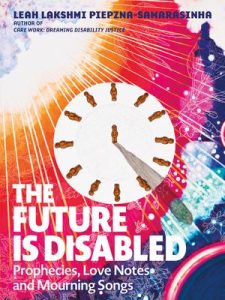 The future is disabled : prophecies, love notes and mourning songs by Leah Lakshmi Piepzna-Samarasinha
The future is disabled : prophecies, love notes and mourning songs by Leah Lakshmi Piepzna-Samarasinha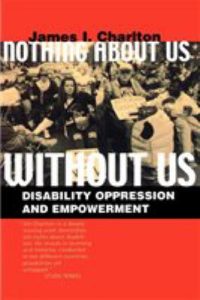 Nothing about us without us : disability oppression and empowerment byJames I. Charlton
Nothing about us without us : disability oppression and empowerment byJames I. Charlton
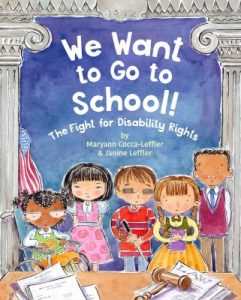 We want to go to school! : the fight for disability rights by Maryann Cocca-Leffler and Janine Leffler
We want to go to school! : the fight for disability rights by Maryann Cocca-Leffler and Janine Leffler 



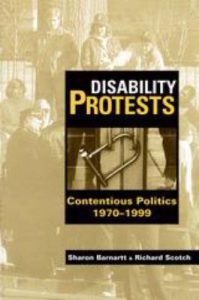
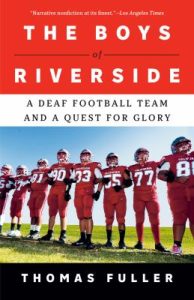 The Boys of Riverside : A Deaf Football Team and a Quest for Glory by Thomas Fuller
The Boys of Riverside : A Deaf Football Team and a Quest for Glory by Thomas Fuller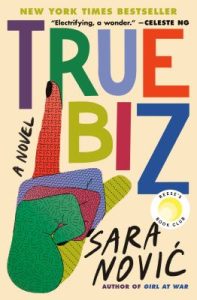
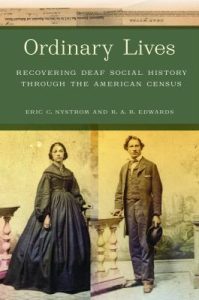 Ordinary lives : recovering deaf social history through the American census by Eric Charles Nystrom and R.A.R. Edwards
Ordinary lives : recovering deaf social history through the American census by Eric Charles Nystrom and R.A.R. Edwards 